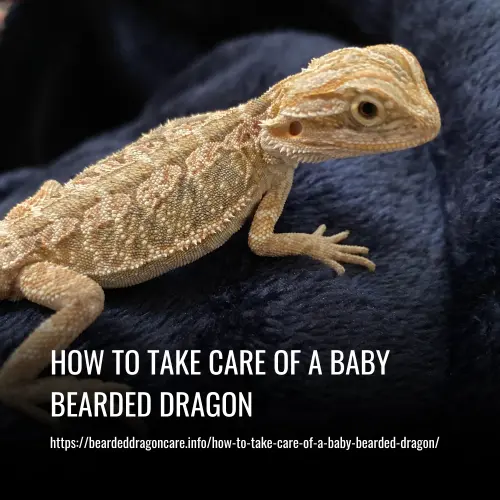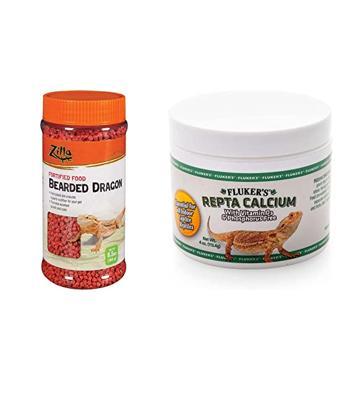Bearded dragons are incredible animals, but they can sometimes be very picky eaters. If your bearded dragon refuses to eat and you don’t know why there could be several possible causes.
This article will share some of the usual causes why your pet bearded dragon isn’t eating.
The good news is that you can reverse the situation in many cases.
We’ll look at the potential causes for your beardie’s refusal to eat such as poor diet, improper husbandry, health conditions, unsuitability of food offered, and seasonality. With some detective work and a few simple fixes, you can get your beardie back in eating shape!
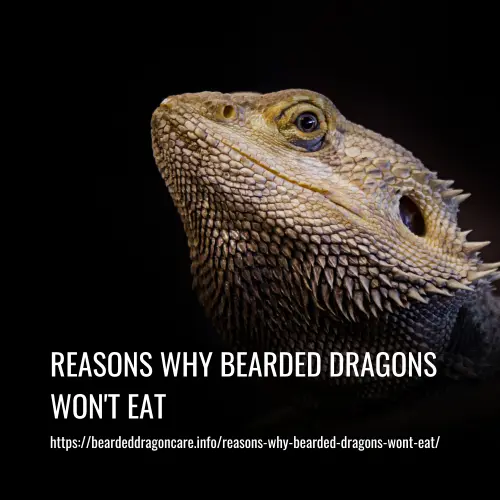
Reasons Why Bearded Dragons won’t Eat
It is normal for owners to be concerned when their pet Bearded dragon is not eating. Those concerns are only sometimes justified. Very often the reason for a Bearded dragon not eating can be identified and the problem can be rectified.
New environment
Newly obtained Bearded dragons often experience huge changes in their new environments. This is even more pronounced with new, baby Bearded dragons. A new environment will lead to some degree of stress and all sorts of behavioral abnormalities such as glass surfing, hiding, aggression, and eating abnormalities.
It is normal for a new Bearded dragon to take some time to adapt to its new environment. It is important for owners of new Bearded dragons to give ample, non-disturbed time to do so.
Emotional Distress
If your Bearded Dragon suddenly stops eating, chances are it may be experiencing emotional distress. There are a few possible reasons why your Bearded Dragon has become disinterested in its food.
It could be something as small as a change in its diets, such as being fed fewer vegetables or the introduction of new foods. Even simple changes like rearranging their enclosure and modifications to lighting and temperature can cause stress that suppresses their appetite.
Brumation
During the cooler months of winter, Bearded dragons are known to go through a mild form of hibernation (called brumation). During this period many Bearded dragons will eat less and even start to lose weight. This is a normal occurrence and should not be altered.
Incorrect food and food size
The size and type of food are often the reason for Bearded dragons not eating. Apart from not being used to new food items (see below), food that is too large or too small might not be eaten. As a general guideline, food items should not be larger than the distance between the eyes of a Bearded dragon. From experience, Bearded dragons might also refuse to eat food that looks dangerous or has caused problems in the past. A good starting point in these cases is to feed the correct-sized crickets and or Dubia roaches and a mixture of variable-sized greens.
Food changes
As with its size and type, changing foods are often a reason for Bearded dragons not to eat. This is often seen when a Bearded dragon is used to one type of food and is suddenly given something else. Mealworms are, for example, considered very tasty to Bearded dragons, and moving to a different (more nutritious food) can often cause temporary eating strikes.
Image with permission from South Texas Dragons.
Satiety
Another reason for Bearded dragons not to eat is, simply, being full. This is seen when feeding frequencies are too close together or when a large meal was fed, even a day before. In these cases, a Bearded dragon will have a predictable pattern where they will or will not eat (e.g. once every other day).
Bullying
Larger Bearded dragons can bully smaller ones up to the point where they stop eating. To see if this is the case, try to feed them on separate ends of the enclosure or remove the larger one.
Incorrect heating and lighting
Bearded dragons are often seen not eating when their environmental temperature and/or UV lighting is not up to scratch. Too high or too low temperatures will lead to stress and digestion problems.
Temperature-related problems are often encountered during the winter months (see brumation discussed earlier) or when the feeding times are shortly after heating equipment has been switched on (e.g. early in the mornings).
Inadequate ultraviolet (UV) lighting will lead to the inability to see food properly. Owners often complain that their Bearded dragons are not eating properly when, in fact, the only problem is that the efficiency of the UV lighting has faded over time.
Excessive handling
As with newly obtained Bearded dragons, excessive handling can also lead to abnormal eating behavior. Sudden changes in environmental temperatures can take time to get accustomed to. In these cases, it is better to keep handling to a bare minimum or allow an hour or two before or after its feeding time.
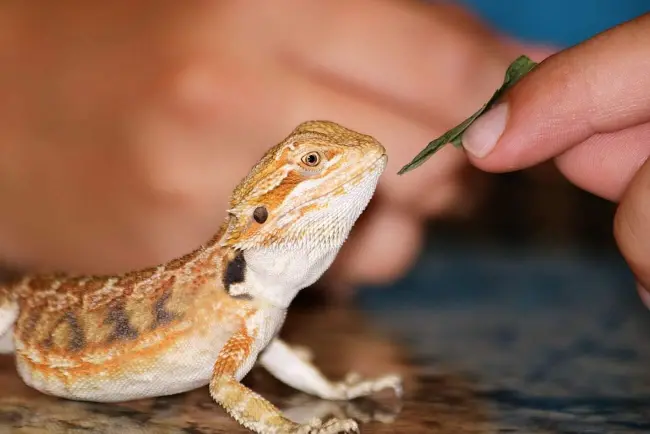
Diseases
It almost comes without saying that a sick Bearded dragon will eat less or not eat at all.
If your bearded dragon won’t eat, it may be due to something more serious than simply not having much of an appetite. It could be a sign that your beloved pet is suffering from an illness. To rule out environmental factors and other obvious health hazards, take your reptile friend to a vet for an examination.
The vet may even ask you to bring along a sample of its droppings in a clean container. This can give the specialist vet some helpful information in diagnosing your pet’s illness.
Uncomfortable Impaction
If you’ve noticed that your bearded dragon isn’t interested in eating, it could be because of impaction. Impaction is a condition similar to constipation in humans and is caused by an accumulation of undigested food items – such as too many live insects or a diet with a poor ratio of insects and veggies – in the gut.
In some cases, substrate impaction may also occur if your beardie ends up consuming materials it cannot digest, like sand or small rocks.
Impaction can be quite uncomfortable for bearded dragons and should be addressed immediately if observed. Take your bearded dragon to the vet or switch to shelf liners, newspapers, or reptile carpets so as to prevent this from occurring again.
With impaction usually come appetite issues and thus, know that this could very well be one of the main reasons why your bearded dragon won’t eat.
Parasites
If your bearded dragon has suddenly stopped eating, a possible cause could be parasites. It is important to use only trusted sources for live feed for your beardie in order to make sure that it does not get parasites.
These parasites can take up nutrients from the digestive system, which will lead to your beardie not feeling hungry. At the same time, it can also cause it to gain weight as it compensates for the bugs taking away essential nutrition.
Wild insects should be avoided as they may harbor harmful bacteria, toxins, and parasites that can make your reptile sick.
Infection (Mouth Rot)
If your bearded dragon won’t eat, it could be a sign of infection. One such infection that often affects beardies is known as mouth rot, which can be painful and cause them to lose their appetite.
Look out for signs such as swelling around the head, excessive saliva production, loose teeth, pus formation, or even bleeding. All of these may be an indication that your dragon is suffering from mouth rot and needs medical attention.
So if you’re concerned that your bearded dragon isn’t eating, then always step in and get it checked out by a professional!
Injury
When it comes to bearded dragons and appetite, there could be many reasons why your dragon won’t eat. One such reason may be physical injury caused by improper handling or confrontation with another dragon.
Younger beardies are especially vulnerable due to their weaker bones, so it’s important to be particularly mindful of them.
If you observe any signs of trauma or injury on your bearded dragon, such as broken bones or a lifeless limb, then immediately take him to the vet for treatment. more than likely, your vet will suggest rest and plenty of fluids until the injury heals.
In the meantime, pay special attention to its food intake and watch if there is any noticeable decline in its appetite.
End of Growth Spurts/Age
As a bearded dragon owner, it can be worrying when your pet stops eating. There are several potential causes for this, such as the end of the rapid growth stage and a change in diet.
During the hatchling and juvenile stages of a bearded dragon’s life, they will eat frequently to sustain their growth; however, once they reach maturity their appetite is likely to decrease considerably. This is because their metabolism slows down due to the end of their growth spurt.
Shedding
If your bearded dragon isn’t eating, it could be due to the shedding. This is because the shedding process can cause your dragon to feel uncomfortable and itchy, which can lead to a loss of appetite.
They may also feel dry and this constant feeling of discomfort can cause them to be in a bad mood and not want to eat.
Additional
A Bearded dragon owner has pointed out that her female Bearded dragon refuses to eat each time she falls gravid without a male. This will be the case even if the eggs are fertilized. When there are eggs in the abdomen, there is less space in the abdomen for the stomach to expand. This will lead to a fuller experience. During these times it is important to focus on food items with high amounts of proteins, e.g. crickets and Dubia roaches to fill the nutritional gap.
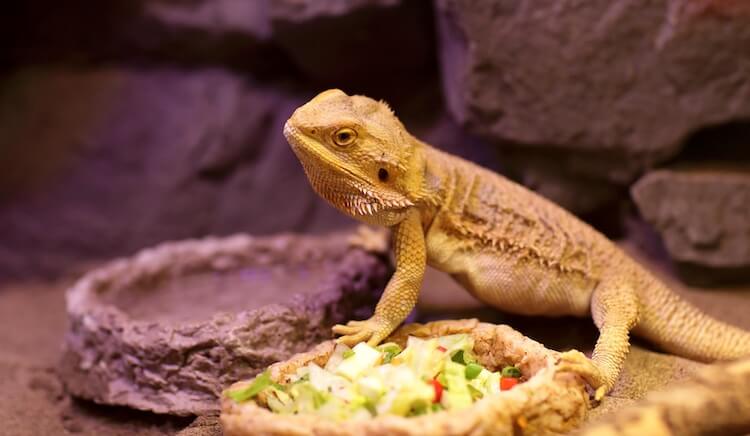
How To Get Your Beardie To Eat
Here are some suggestions to make your Beardie eating habits better:
Foods to Stimulate Appetite
If you’re having trouble getting your beardie to eat, then you might want to try some of the foods known to stimulate appetite. Canned pumpkin is a great choice as it can be mixed with chopped greens or vitamin supplements and served as part of their regular food dish.
You can also try spoon-feeding your dragon with canned pumpkin or vegetable-based baby food. Again, adding a few greens or vitamins to the mix may help encourage them to start eating on their own. With the right approach, you should have success in getting your beardie to eat!
Food Colors
If you want to get your Beardie to eat, the best way to do it is by offering them food in colors that will catch their eye. Your dragon is naturally drawn to the hues of red, green, and yellow.
That’s why many of their favorite foods come in these vibrant hues – think pumpkin, butternut squash, yellow squash, red peppers, strawberries, raspberries, and more!
All these colorful fruits and veggies can also help provide important vitamins and minerals for your dragon’s diet (as if they needed more reasons to eat!).
Dish Colors
When it comes to getting your beardie to eat, color may play an important role. While food is obviously the most important factor, dish colors can also have an influence on appetite. Generally, warmer colors such as red, orange, or yellow will be more likely to get a response than cooler colors like blue.
I’ve used both and I’d definitely recommend experimenting with the reddish dishes first if you’re looking for ways to get your beardie interested in their meals. Furthermore, having these dishes visible on the outside of their enclosure can also help encourage them to explore and search for their food.
Bugs/Bait & Switch
Sometimes it can be tricky to get your beardie to eat, especially if they are off-feed. One technique you can try is the “bait and switch”. Here’s how it works: pick out your dragon’s favorite bugs and give them one at a time, while you carefully slip some vegetables or greens into their mouth as they chew.
Force Feeding
Getting your bearded dragon to eat can be quite a challenge. You may have tried various methods and still not see success. One option that may work is force-feeding, but it should only be done under the direction of an experienced reptile vet.
It could be stressful for your Beardie, so don’t attempt it unless recommended by your vet and if you’ve never done this before, they’ll show you how to do it safely at home.
Your vet may also recommend a type of solution to feed like Oxbow’s Critical Care which helps ensure your pet gets the important amount of nutrition they need.
Overall, I strongly suggest seeing a reptile vet before force-feeding because there are other options that may work as well and it’s best to get their expert advice first!
FAQs
What Should I Feed My Bearded Dragon?
If you’ve got a bearded dragon as a pet, then you’ll need to know what to feed your beardie. Bearded dragons are omnivores, so they eat both meat (insects) and plant matter (vegetables).
When it comes to insects, dubia roaches, crickets, and mealworms (as an occasional treat as these are high in fat) are all good choices.
When feeding your bearded dragon vegetables, consider giving mustard greens, turnip greens, collard greens, kale or carrots for optimal nutrition.
Spinach, beets, avocado or rhubarb should be avoided. You may also want to consider adding calcium and vitamin supplements as well which can help prevent vitamin deficiency.
Be sure to cut the food into bite-size pieces as this will help with digestion too!
When Should You Go To The Vet?
If you see any signs of distress or injury in your bearded dragon, like swelling, pus, or paleness, then it’s important to take it to the vet right away. Visiting the vet to detect and treat problems early is always the best option for your beardie’s health.
However, before you visit a vet you should do a thorough check of your dragon’s enclosure to ensure that everything is in tip top shape. This can help rule out other factors that may cause issues such as a lack of appetite.
Conclusion:
Bearded dragons are usually quite docile and easy to handle, however, issues with an appetite can still occur. At the end of the day, the most important thing is that you make sure your bearded dragon is happy and healthy.
If one of these issues arises, you should approach it with caution and thoughtfulness for your reptilian friend’s best interest. With a little bit of detective work and problem-solving skills, you will soon see your pet back to normal eating habits.
